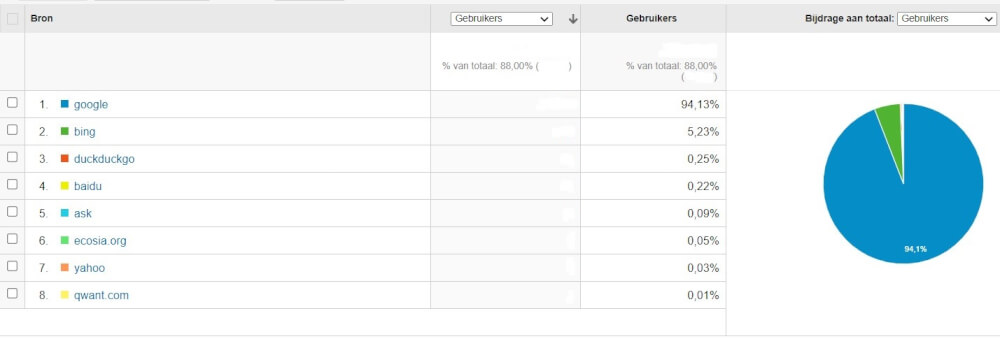Test case - What is the share of other search engines?
In this blog post we have an interesting data set for you, as with any website or case we will not show the domain name or give exact numbers. However, in this case we can provide some interesting input. Namely, what share do other search engines have in the traffic of a Dutch website on a yearly basis? We will discuss this in this blog post!
We have already discussed this in previous blog posts, but now we have hard results to fall back on. There is often the question of how important it is to focus on Google search traffic. There are many other search engines that are also used a lot. Like DuckDuckGo, Bing, and Ecosia. With search engine optimization, you can make sure that your website hosting will rank higher in the results of all search engines. But what kind of traffic can you expect from search engines other than Google. That is the question we will address in this blog post.
The numbers of a year
A website's yearly numbers are important to dig around in. With clear insights, you can adjust things for the next year and try some things that gave the best results. Traffic from natural search engine results is especially valuable. You don't have to pay for it directly per click like you do with advertising, for example. And that's why people fight hard to be at the top. Especially within the Google search engine. Of course, the percentages we gathered from one of our personal projects is just a snapshot, and it can vary from website to website. The only thing we can share about this website is that it is a Dutch website, built with WordPress and is more of a blog, sharing useful tips that people are looking for. Not a commercial website or webshop.
Google in first place
This won't surprise you, but Google is at the absolute top with 94.13%. This is because the majority of users use it. Google simply has a monopoly in this area. And you as a webmaster should respond to this by following the rules set by Google. For example, by using unique content, fast website hosting, and a website that is suitable for use on all devices. In total, there are an estimated 200 factors that Google considers when ranking websites on its search engine.
Bing in second place
Bing holds the second place with 5.23% of the percentage of traffic coming from organic or natural search results. This shows that the usage of Bing is many times less than the usage of Google. But it does have a percentage of a website's search traffic. And it can also bring a certain percentage of visitors to the website. In other countries, that number is about the same as other websites. And is thus second in the world.
DuckDuckGo in third place
DuckDuckGo I personally have seen a lot of advertising in train stations in Germany and the Netherlands this year, with large billboards advertising the search engine that cares about your privacy. We also see DuckDuckGo getting more and more shares every year. For an English language site, it only makes a difference of a few hundred visitors a year to Bing. And has a share for that Dutch language website of 0.25%. The English language website is close to the 2% with 1.98%. In the Netherlands, this search engine still has some market share to make up.
The other search engines that also count with a small market share
Other search engines like Ecosia also have a user share. Ecosia is known as the green search engine because they plant trees for every single search. This is of course popular with the younger generation and I've seen it in ads on Instagram. Coincidentally, I saw Ecosia installed on an acquaintance who has nothing to do with internet marketing. The only motivation was to plant trees. That's not saying much, of course, but it shows that the very targeted marketing campaigns and posts promoting Ecosia are working. Perhaps they'll be able to capture more market share in the future. For this test case, they were at 0.05% last year. Other search engines with lower and some higher shares are Yahoo, Baidu and Ask. However, like Ecosia, these shares are quite low and are mainly used by users who grew up with them. Ecosia is the interesting new party in my opinion.
Will this change in the future?
Of course, more people and users will make the switch as privacy reasons become more prominent in the news. But the main point remains that Google is good at what they are known for. Showing the right results for a search. No matter what error message you have in developing your website, for example, you can find it on Google. Other search engines are perfect for many applications, but can't always handle deeper searches the way Google does. This is another issue that will improve as more users use DuckDuckGo. More users means more data sets, which can then be used to improve search results. It's a circle that can be hard to break at times.
The future will tell if Google's monopoly will be broken by other search engines. It is advisable to keep this in mind as we do in this blog post. And keep an eye on this annually for your website. And to act on it when more users come from there. Like creating Bing Webmaster Tools and tracking the results. What are your numbers for your website? Let us know on social media!
